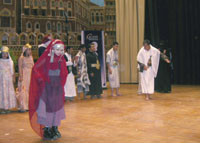
Disabled children shine at celebration [Archives:2006/984/Reportage]
September 25 2006
 |
Approximately 150 people gathered to attend the Special Requirements Association's annual celebration, which took place Sept. 18 at the Cultural Center. Families, friends and organizers put forth great efforts to enhance the performance of the handicapped and help them be productive society members.
The association embraces 94 full-time students, who were the stars of the celebration. Moreover, the association takes partial responsibility for more than 900 children with different disabilities, in addition to its full-time students.
At the entrance to the celebration hall, a small exhibition was held displaying beautiful handicrafts and dolls for sale, student products which they'd been taught to make at the association.
Jamila Ghalib Al-Sharie, projects program director at Al-Saleh Foundation for Development, noted, “This ceremony means a lot to many. It's the fruit of the association after working hard the whole year. Moreover, it makes the handicapped proud of who they are and empowers them to face and live in their communities and environments.”
During the ceremony, performers went all out to please attendees – they sang and acted in a socio-political play with a message reflecting their convictions and awareness of political rights such as voting. Athletic students amazed the crowd with their stunts and acrobatics.
The celebration included a fashion show wherein boys and girls wore traditional costumes representing various Yemeni governorates and then happily danced. Lastly, with hearts full of hope and heads raised high, they came onstage carrying flags from all Arab nations, dreaming to be united one day.
The student performers might as well have been walking on air with delight. “I'm so happy! I hope to be a doctor in the future,” enthused Mohammed Al-Nahari, a mentally disabled student at the association.
Faiza Al-Mutawakil, an air flight engineer and mother of a disabled child, commented, “My son is a student at this association and he's really getting better and better. My advice for every family with a disabled member is to be patient, realizing that empowering their handicapped child isn't going to be easy. In my point of view, the most important way the association can improve is through adequate staff training.”
Riham Al-Ariqi, a teacher at the association, agreed, “We need training courses to improve ourselves and deal with our students' individual cases.”
Association director Mona Salem Bashraheal stated, “The association aims to reflect the disabled person's abilities and talents, which need to be refined.
“For a long time, we lacked psychological experts, but now the Educational and Psychological Counseling Center supports us, dedicating certain days to giving lectures and advice to association students' families on how to deal with their disabled children. They also provide professional counsel and assist in some difficult cases,” she explained.
Bashraheal continued, “However, we lack our own suitable premises with in-built disability facilities. Every year, we have to move to a different place due to high rent and increasing numbers of students, so we keep wandering around to find a suitable place. Adequate educational materials also aren't available in Yemen and even if they are, they cost an arm and a leg.”
Attendees – both guests and students' families – were quite satisfied with the association ceremony. Najeeb Mohsin Al-Amri, a handicapped actor working at the Cultural and Tourism Ministry, said such celebration is very important for the disabled. “It's important for me as well because it gives us a feeling of delight at the things disabled people can do, mixed with a sense of dignity and honor.”
According to attendee Ibrahim Al-Shaiha, a student at the National Institute for Vocational Training, “The significance of such a ceremony lies in its impact on the entire society. It encourages everyone to realize the fact that disabled people are creative and productive and we must help them when they need it.”
——
[archive-e:984-v:14-y:2006-d:2006-09-25-p:report]


